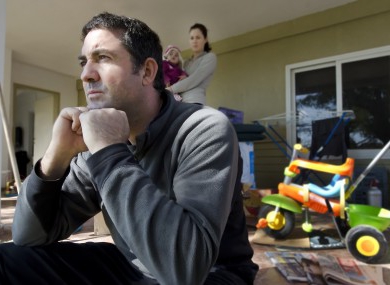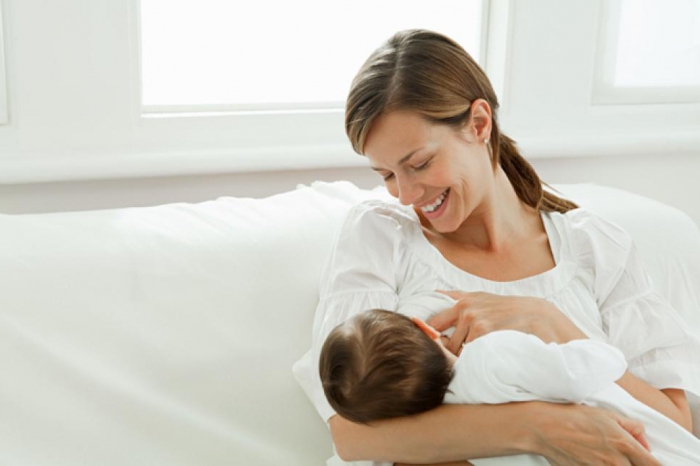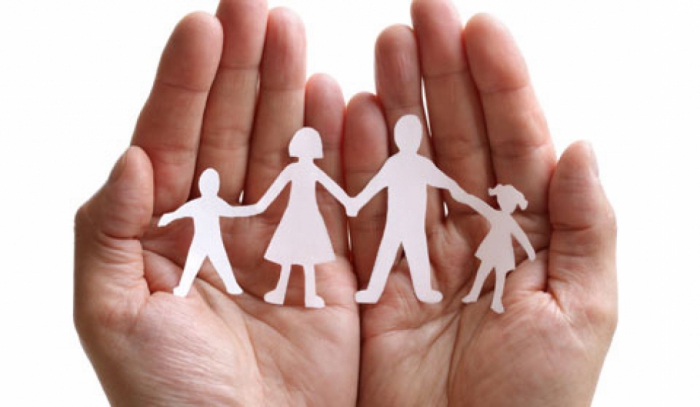Existing system state support families with children provides in 2017 to citizens of the Russian Federation located in Russia a monthly allowance in the amount of 40% of average earnings only. After the child reaches the age of 1.5 years, for two decades the care allowance will be provided only in the form of a month. At the same time, given the large-scale shortage of nursery groups, a child can be sent to kindergarten only from the age of 3, while the majority of the Russian population does not have the opportunity to hire a nanny for a one and a half year old child, who will need to be paid a salary.
Monthly compensation payments to certain categories of citizens in the amount of 50 rubles are made on the basis of (last edition of the document dated July 1, 2014).
This monthly payment is still in the nature of compensation in 2017. Funds are provided to mothers (or other relatives actually caring for the child) who are on parental leave until the age of 3:
- those who are in labor relations on terms of employment with enterprises and organizations, regardless of their organizational and legal forms;
- women military personnel.
Bill No. 1174985-6 of September 15, 2016
On the eve of the next elections to the State Duma on September 18, 2016, deputies from the LDPR introduced a draft federal law No. 1174985-6, providing:
- extension of the period for payment of child care benefits from 1.5 to 3 years;
- increasing it minimum size multiple of the minimum wage (minimum wage):
- in size one minimum wage(RUB 7,500 until July 1, 2017) - for the first child;
- two minimum wages(15,000 rub.) - for the second child and subsequent ones.
According to legislators, only in this case will the “minimum necessary level of child care” be ensured and the requirements of the international Convention of November 20, 1989 on the Rights of the Child will be met.
The date for consideration of the bill in the first reading has not yet been set, however, due to the fact that the document assumes a significant increase in federal budget expenditures, in accordance with clause 3 of Art. 104 of the Constitution, in order to submit it to the State Duma, the approval of the Government of the Russian Federation is required, which the authors of the document most likely did not receive. Many good proposals made in previous years have already been rejected on this basis.
Thus, this can be considered a violation of the regulations of the State Duma, and moreover, such a law cannot now be approved by the Government at all due to the difficult economic situation (remember the famous “no money” performed by the Prime Minister Dmitry Medvedev). Therefore, for now, unfortunately, it is not necessary to consider this document as anything other than an election promise.
On October 10, this law was returned to deputies for revision, and November 8, 2016 it was re-submitted to the State Duma and registered under the number 22852-7. This time, the authors of the bill tried to fulfill all the formalities and received a government opinion - unfortunately, negative. The government did not support this bill, since its financial and economic justification does not indicate the source of additional funding for the payment of benefits from the federal budget.
Bill No. 648289-6 of November 11, 2014
On November 11, 2014, deputies of the State Duma from the Communist Party of the Russian Federation and A Just Russia factions introduced another bill with the initiative to extend the payment period from one and a half to three years. In addition, the document registered under number No. 648289-6 also provides for the establishment of a minimum guaranteed amount of this type of state social assistance in multiples of living wage for the working population, established in general by Russian Federation:
- for the first child- in size one living wage;
- for the second child and subsequent children- in size two living wages.
In accordance with Decree of the Government of the Russian Federation dated November 30, 2015 No. 1291, the cost of living for the working population in Russia as a whole for the third quarter of 2016 was set at 10678 rub., which is 3.5 times higher than the monthly payments for the first child RUB 3,065.69
Minimum monthly benefits equivalent to the amounts at the beginning of 2017 10678 rub.(when supervising and caring for the first child) and RUR 21,356(for the second and subsequent ones) in accordance with the current law, it is proposed to establish:
- citizens who are not subject to compulsory social insurance in case of temporary disability and in connection with maternity (and), as well as mothers fired during pregnancy due to the liquidation of the organization;
- working citizens during a stay of up to 3 years, subject to a low length of insurance coverage or low official wages.
In addition, the bill provides maximum size monthly child care allowance in the amount of four subsistence minimums for the working population ( 42712 rub. in amounts equivalent to the beginning of 2017) for certain categories of citizens:
- persons passing military service under a contract or other service equivalent to it;
- persons dismissed during maternity leave, as well as mothers dismissed during maternity leave due to the liquidation of the organization.
Moreover, in accordance with the current law, the maximum monthly child care benefit for these categories of citizens in 2017 is RUB 12,262.76(which is the same 3.5 times less than that proposed by deputies from the Communist Party of the Russian Federation and A Just Russia).
The date for consideration of bill No. 648289-6 in the first reading has not yet been set. In fairness, it should be noted that the amounts proposed for payment too big compared to other payments to families with children, to be true.
Bill No. 558761-5 of June 28, 2011
Back in June 2011, State Duma deputies from the Fair Russia faction E.B. Mizulina, A.V. Kuzmina, O.L. Mikheev (State Duma Committee on Family, Women and Children) introduced bill No. 558761-5 “On amendments to certain legislative acts of the Russian Federation regarding the extension of the payment period”.
Consideration of the bill after another postponement was scheduled for mid-2014, but was postponed again - now for an indefinite period.
In order to gradually increase the financial burden on the Fund social insurance and the federal budget, it was proposed to gradually introduce the provisions of the bill on the territory of the Russian Federation:
- first stage(21 federal subjects since 2012) - in the Altai Republic, the Buryat Republic, the Tyva Republic, the Kamchatka Territory, the Krasnoyarsk Territory, the Arkhangelsk Region, the Astrakhan Region, the Volgograd Region, the Jewish Autonomous Region, the Irkutsk Region, the Kaliningrad Region, the Kurgan Region, the Moscow Region, Omsk region, Sakhalin region, Tomsk region, Ulyanovsk region, Yaroslavl region, Nenets Autonomous Okrug, Khanty-Mansiysk Autonomous Okrug - Yugra, Yamalo-Nenets Autonomous Okrug;
- second stage(24 federal subjects since 2013) - in the Republic of Adygea, the Republic of Kalmykia, the Republic of Karachay-Cherkessia, the Republic of Karelia, the Republic of Mari El, the Republic of Sakha (Yakutia), the Republic of Udmurtia, Altai Territory, Transbaikal Territory, Krasnodar region, Primorsky Territory, Stavropol Territory, Voronezh Region, Ivanovo Region, Kemerovo Region, Kostroma Region, Kursk Region, Nizhny Novgorod Region, Novosibirsk Region, Pskov Region, Samara Region, Sverdlovsk Region, Smolensk Region, Tver Region;
- third stage(38 federal subjects since 2014) - in the Republic of Bashkortostan, the Republic of Dagestan, the Republic of Ingushetia, the Kabardino-Balkarian Republic, the Komi Republic, the Republic of Mordovia, the Republic of North Ossetia - Alania, the Republic of Tatarstan (Tatarstan), the Chechen Republic, the Chuvash Republic - Chuvashia, Perm region, Khabarovsk region, Amur region, Belgorod region, Bryansk region, Vladimir region, Vologda region, Kaluga region, Kirov region, Leningrad region, Lipetsk region, Magadan region, Murmansk region, Novgorod region, Orenburg region, Oryol region, Penza region, Rostov region, Ryazan region, Saratov region, Tambov region, Tula region, Tyumen region, Chelyabinsk region, Moscow, St. St. Petersburg - cities of federal significance, Chukotka Autonomous Okrug.
In the conclusion to the bill presented by the Government of the Russian Federation, it is indicated that its financial and economic justification does not contain a full assessment of the financial consequences of implementing the proposed solutions. In addition, the draft law are not taken into account increase in federal budget expenditures for the payment of monthly child care benefits to persons not subject to compulsory social insurance in case of temporary disability and in connection with maternity, as well as persons undergoing military service and service in federal ministries (Ministry of Internal Affairs, fire service, customs authorities and etc.). In this regard, the Government of the Russian Federation indicated the initiative was not supported.
Means-based childcare benefit for children under 3 years of age
On March 27, 2015, Prime Minister Dmitry Medvedev, during a working trip to Yaroslavl, took part in the All-Russian Forum of Social Workers, where the issue was once again raised about increasing the size benefits (compensation) for child care up to 3 years old.
The Prime Minister noted his position on the current situation in the following words:
“We should not spread all this in a thin layer over all categories of people. What is 50 rubles? Nothing. One dollar. Who needs this benefit? No one."
Taking this into account, a direction was proposed for a possible increase in the amount of the monthly payment, taking into account integrated targeting approach. For this it was proposed:
- to provide families with children with additional material support (according to Prime Minister Medvedev, not all mothers need to pay benefits up to 3 years, and already when the child reaches 1.5 years old, many of them find an opportunity to renew labor activity at the place of work);
- highlight taking into account the developed criteria categories of people in need in a monthly payment for a child under 3 years of age (for example, in a region with a shortage of nursery groups in kindergartens or);
- develop a mechanism for financing identified families for "totally different beginnings", including involving the opportunities of employers.
In addition to this, Dmitry Medvedev noted that in the context under consideration, it is advisable to revise the norms of the current labor legislation to encourage mothers to go to work when the child reaches one and a half years old and to create favorable working conditions to ensure the possibility of earning money and supporting the family and child, in particular:
- granting parents with children under 3 years of age the right to part-time;
- legislative regulation of the right of such families to flexible work schedule.
In addition, the prime minister announced intensive construction in the country preschool institutions containing nursery groups, within the framework of the existing program for the construction of new kindergartens at an “accelerating pace”, which was not observed here either in the Soviet period or in the post-Soviet period.
In June 2015, the Minister of Labor and Social Protection Maxim Topilin stated based on the results of the work of the government expert group that the establishment of a full-fledged based on targeted principles will require annually at least 50 billion rubles federal budget, which can be difficult in a crisis.
Pregnancy is a wonderful and exciting time for an expectant mother. But after it comes another exciting period, during which you will have to take care of issues such as applying for benefits. Usually paid child benefit up to 3 years (but sometimes women go to work earlier, and they stop accruing it altogether).
New mothers have many questions regarding this issue.
Benefit up to 3 years: law
In our country, there is a separate law that regulates the correct calculation and amount of benefits paid to young mothers for their children. True, not everything is so smooth. And, despite the fact that there are legal documents, many are not satisfied with the receipt and the whole process.

By law, a woman has the right to receive a monthly payment if she stays at home with her child and does not work (at least not officially registered). True, the benefit for up to 3 years is not that big.
To process the payment, you need to collect documents and provide them either at your place of work or at the department social protection population. Otherwise, no one will ever charge anything.
And even though this whole issue is regulated by law, in reality the payments received are barely enough to buy diapers, cereals and other little things the baby needs.
Benefit amount
The entire period of maternity leave can be divided into two stages: from the birth of the baby to one and a half years and from one and a half to three years. Of course, there is no significant difference for young mothers, but what is different is the amount of benefits up to 3 years.

Until the baby turns one and a half years old, the mother (or the person for whom the benefit is issued) will receive 40 percent of the official salary (no more than this value) or as much as is established in each region for unemployed people or students universities
Officially, after the child is one and a half years old, the amount of benefits up to 3 years will be equal to 50 Russian rubles. This amount can only increase due to regional coefficients or due to additional payments from the organization in which the mother is officially registered.
Child benefit: types
As mentioned above, the entire maternity leave can be divided into two stages. So benefits will be paid in the same way.
There are several types of payments that a mother (or another family member caring for the baby) can receive:
- A one-time benefit paid to each mother who gives birth to a child. To do this, you need to contact either your place of work or your father’s place of work. In this case, you will need to provide a certificate stating that the second parent did not receive such benefits. As for the unemployed, to receive payment they should contact the social protection authorities.
- Additional one-time benefit. It is paid after the birth of a child only if the funds are included in the regional budget. Its size also depends on the funds available in the treasury. In order to process the payment, you must contact the social protection departments.
- Care allowance for up to one and a half years. The size of this payment depends on what the woman’s official salary was. If it was completely official, then the size of the payment will be quite decent. But if the portion was issued “in an envelope,” that is, unofficially, then the benefit will be calculated only according to the official portion. If the woman did not work, then she will need to contact the social protection department and apply for benefits there.
- Allowance for caring for a child from one and a half to three years. Working mothers can also apply for it at their place of employment, and unemployed ones can apply for it at social security departments.

Who can apply for benefits
Based on our legislation, we can say with confidence that not only mothers can apply for the above benefits for their child. There are also categories of citizens who have every right to do this.
Child benefits up to 3 years of age can be issued by:
- The mother or father of the child, the main thing is that they are not deprived parental rights.
- Grandparents if the child’s mother did not go on appropriate leave.
- Adoptive parent if there are all documents confirming this fact.
In addition to the listed groups of people, any other relative who directly cares for the baby can apply for benefits.
How to apply
In order to process all of the above payments, you need to collect a certain package of documents.
If the mother worked before going on maternity leave, then she will only need to provide documents for the child, since all the others are available in the HR department.
If it concerns non-working mothers, then before going to the social welfare departments, you need to prepare.

General list of documents
Separately, it needs to be said about what documents a person who will apply for benefits may need.
The full package of documents will include:
- All documents for the child. It is advisable to take care of this in advance, since some organizations require SNILS, which takes more than one day.
- Certificate from the second parent’s work, if issued lump sum allowance(if one of the parents works).
- A document from the employment center in the event that a woman does not work and is going to apply for a payment to the social security authorities.
- Details of the account to which the money will be transferred. If the benefit is issued at work, then no details need to be provided. In the event that this happens in the social security authorities, it is necessary to create either savings book, which is issued immediately to your hands (you just need to put a small amount on it - about 50 or 100 rubles), or a Sberbank bank card.
Documents that stay-at-home mothers need to collect
There is a list of documents that stay-at-home mothers will need to provide in order to receive a monthly allowance for up to 3 years:
- first of all, this is the baby’s birth certificate;
- a copy of the marriage certificate (if it is officially registered);
- certificate from place of work the second parent that he is not in maternity leave and does not receive appropriate payments;
- a copy of the work book.

The law provides for cash payments to those mothers who remain on maternity leave until the child reaches three years of age. The amount is actually funny, it is equal to 50 rubles. But in order to teach her, you also need to collect a package of documents (if it is prepared by the social security authorities) or come to the place of work and write an application.
Termination of payments
There are a number of cases when child benefits under 3 years of age cease to be paid:
- A woman goes to work before the child is three years old. This happens when a place in kindergarten received earlier or another family member is sitting with the child.
- If a woman goes to repeated leave on pregnancy and childbirth.
- If the mother is prescribed unemployment benefit(this happens rarely and only when the payout is larger).
- If a woman writes a letter of resignation from her workplace of her own free will.
- If the child, due to some circumstances, was transferred to full state support.
- If the person who cared for the child (mom or dad) was deprived of parental rights.
True, in each of these cases, the person for whom the benefit is issued must himself warn about the changed circumstances. In fact, this is rarely done, especially when a parent is deprived of his rights to a child.
Increase in benefit amount
- Children of military personnel, especially if the parent is serving in conscription. It doesn't matter whether the parents are married or divorced. The main thing is that the father acknowledges paternity and is officially in the service.
- Children whose parents evade paying legal child support. In order for the size to increase, a court decision is needed.
- Children without a father. This refers to the situation when the mother has the official status of “single”.
- Disabled children. The benefit in this case will be increased to 8,700 rubles.
The nuances of this issue
Despite the fact that both in the antenatal clinic and at work the expectant mother is advised on all issues related to future payments, she has a lot of questions related either to the registration process or, as they say, “to general points.”
One of the most common misconceptions is that after the birth of a child you do not need to write any application and the benefit will be issued on its own. No one will ever do this for you.

To start receiving monthly payments, you need to go to your place of work and write a corresponding application (the HR department will help), or contact the social security department. It is better to do this a week before the deadline expires sick leave issued while on maternity leave.
Many people think that clear payment of benefits is the responsibility of the employer. Yes, there are times when he delays payments, but by law he is obliged to do this every month. And the size of the payment is not taken out of thin air. There are special formulas that chief accountant makes the calculation.
Recently, information appeared on the Internet that the amount of payments to women who are on maternity leave and whose children are already one and a half years old will be increased. It was said that child benefit up to 3 years (its amount) would increase from 50 rubles to almost 5,000. In fact, these are only plans, and this law has not yet been approved.
Payment of benefits for up to 3 years is one of the most exciting issues, which has many nuances that everyone should know about expectant mother, since it depends on it material well-being and the security of at least some means during vacation.
Many young families face financial difficulties after the birth of a child in the family, because maintenance costs increase tenfold, so the state provides all possible assistance in such cases. Due to the lack of special knowledge, some young mothers use monthly payments to provide for their baby only up to one and a half years old, however, based on the legislation of the Russian Federation, it is possible to extend the terms of payments up to three years. Funds for the maintenance of children under 3 years of age are paid from the budget. In Russia, the amount of benefits for child care up to 3 years is minimal, in contrast to benefits up to 1.5 years, the amount of which depends on salary.
Article 256 Labor Code In the Russian Federation, parental leave is limited to a three-year period. Despite this fact, benefits from the Social Insurance Fund and the employer's budget are paid in full only up to 1.5 years.
Amount of benefit for child care up to 3 years old in 2016-2017.
For 2016 and 2017, the amount of the monthly allowance for caring for a child under three years of age is only 50 rubles per month plus a regional coefficient; this amount was established by law by decree of the President of the Russian Federation of May 30, 1994 No. 1110. Naturally, these funds are simply ridiculous and not will be able to cover maintenance costs, so officials and public figures periodically put forward laws for consideration that would allow extending the period of payments. Many constituent entities of the Russian Federation have independently extended the period of monthly payments, and these funds are financed from the local budget of the regions.
Who is entitled to receive benefits for children under 3 years of age?
Not all young couples can apply for compensation for caring for a child under three years of age, so you need to carefully read the requirements and package of documents for applying for benefits. The compensation is permanent until the child is three years old, but the amount is paid directly to the mother due to the fact that she cannot go to work. Currently, the following categories of the population can take advantage of the right to receive compensation:
- Women who are public service, military personnel and contract employees.
- Mothers are disabled people of groups 1 and 2;
- Young mothers studying at higher education educational institution at the correspondence department;
- Unemployed people who have received official unemployed status due to the liquidation of an enterprise, as well as unemployed people undergoing retraining;
- Women caring for disabled children of the 1st group or elderly people over the age of 80.
- The child’s father, grandmother or grandfather who directly provides upbringing and care for the child;
- Guardians and adoptive parents.
If you belong to one of the above population groups, then you can fully count on child care benefits. To document the benefit, you need to collect a package of documents and send it to the employer or to the social security authorities at the place of registration. You can submit documents for this payment immediately after the child turns 1.5 years old; this right is retained by the parents for 6 months after the deadline for receiving the benefit. If you do not have time to exercise your legal right, payment will be made from the moment you submit your application.
Documents for receiving benefits
The package of documents is the following list:
- An application in the form established by the organization or in free form addressed to the head of the enterprise.
- A copy of the order assigning parental leave with the start and end date of the leave.
- Child's birth certificate.
- A copy of the work book.
- A copy of the passport of a citizen of the Russian Federation.
If you plan to receive compensation from local governments or social service need to submit:
- A certificate from the employment service confirming that unemployment benefits are not issued.
- Child's birth certificate and a copy of the compensation recipient's passport.
- An application indicating the method of transferring funds, by mail or to a bank account.
You can submit documents to the relevant authorities in person or with the help of a legal representative, or you can use the services of the Russian Post. In conditions modern world and development innovative technologies documents can be sent through a single portal of state and municipal services. From the moment the documents are received by the employer or social security authorities and until the decision on payments is made, no more than 10 days pass. The decision specifies the amount of monthly compensation taking into account all coefficients, as well as the period for which these funds will be received.
How is the benefit amount calculated?
Calculating the monthly payment for caring for a child under 3 years of age does not require special knowledge and skills; in accordance with the law, a fixed amount of payments has been adopted in the amount of 50 rubles. Depending on the region of residence, the amount may be increased by a regional coefficient. The accountant of an organization or social body needs to calculate the cost of one day and multiply it by the number of days specified in the decision.
Despite the fact that compensation is often paid by the employer, such payments do not cause serious harm to the organization’s budget. This type compensation is not taxed; accruals are made for the entire period of parental leave. Even if your organization did not provide for such payments, in accordance with the law, the employer is required to make transfers.
Payment of compensation for child care in accordance with Part 3 of Article 256 of the Labor Code of the Russian Federation and paragraph 17 of Order No. 1206 of the President of the Russian Federation of November 3, 1994, terminated upon the occurrence of one of the following events:
- The child reaches three years of age.
- Dismissal of an employee at his own request.
- The employee began work duties before the expiration of parental leave. Compensation remains the same if the employee works from home or part-time.
- Due to various circumstances, the child was transferred to full state support.
- Deprivation of parental rights to a child for whom care was provided.
- The occurrence of various circumstances not specified by legislative acts.
Having analyzed the situation in Russia with the payment of child benefits, we can conclude that full benefits can only be received for children under the age of 1.5 years. Compensation in the amount of 50 rubles per month is quite low, so many young mothers, when their child reaches 1.5 years old, go to work and receive the salary established by the employment contract. For non-working groups of the population, such payments are not provided, but you can receive compensation if you can prove your difficult financial situation and the absence of a breadwinner in the family. Legislative acts and amounts of payments are constantly being reviewed; perhaps in the future, the period for payment of child care benefits will be extended to 3 years. In some regions of the Russian Federation, similar experiments are already being carried out and have excellent results. Before submitting documents for registration monetary compensation Carefully study the standards and additional indicators of your region to indicate accurate numbers in your application.
Prepared by "Personal Prava.ru"



